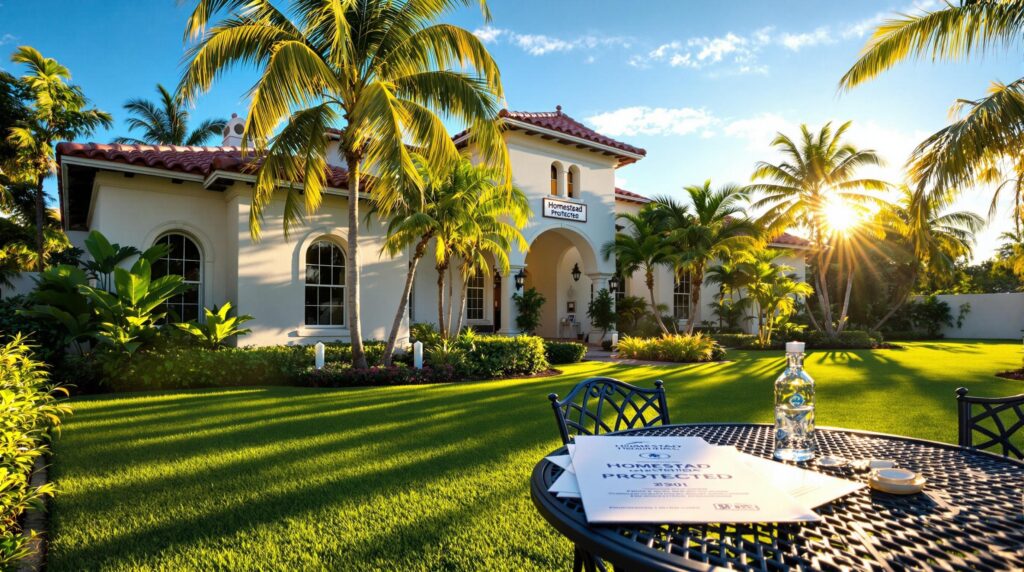Miami homeowners get strong legal protection under Florida homestead laws. If you make a Florida property your main home, you can save up to $50,000 on property taxes, shield your home from debt collectors, and keep your yearly tax increases to no more than 3%. To get these benefits, you need to live in your home by January 1 and sign up by March 1. You’ll need Florida papers like a driver’s license to prove you live there. Older residents and disabled veterans can get extra help. The law also sets rules about passing your home to family members and protects spouses’ rights. These laws give Miami homeowners many ways to save money and protect their property.
Key Takeaways
- Florida homestead exemption reduces taxable property value by up to $50,000 for primary residences owned by permanent residents.
- Applicants must file by March 1st with proof of Florida residency and primary home ownership as of January 1st.
- Homestead protection shields property from most creditors and limits annual tax assessment increases to 3% maximum.
- Both spouses must consent to property sale or transfer, regardless of who holds the deed.
- Seniors over 65 and disabled veterans may qualify for additional exemptions worth up to $50,000 or full tax relief.
Homestead Exemption Eligibility Requirements
To get Florida’s homestead tax break, property owners must meet certain rules. You must live in Florida full-time and own your home by January 1st of the year you apply. The home must be your main place of living. When you apply, you need to prove you live in Florida by showing papers like your Florida driver’s license, voter card, or state ID. You can’t claim tax breaks for living in other states at the same time. If you’re not a U.S. citizen, you need to show papers that prove you can live here permanently. To get the tax break that year, you must turn in your application to your county’s property tax office by March 1st. Once approved, your tax break continues each year unless your situation changes.
Property Tax Benefits and Savings
Florida helps homeowners save money on property taxes in three main ways. First, they can lower their home’s taxable value by up to $50,000. Second, their yearly tax increases are limited to 3% or the rate of inflation, whichever is smaller. Third, homeowners get legal protection from people they might owe money to.
| Benefit Type | Tax Savings Impact | Eligibility Requirements |
| Basic Exemption | Up to $50,000 | Primary Residence |
| Portability | Up to $500,000 | Must Move Within FL |
| Assessment Cap | 3% Max Annual | Continuous Residency |
| Additional Senior | Up to $50,000 | Age 65+ Income Limits |
| Disabled Veteran | 100% Exemption | Service-Connected |
These tax benefits can save homeowners a lot of money each year, especially if they’ve lived in their home for many years and their neighborhood’s home values have gone up.
Creditor Protection Under Florida Law
Florida’s homestead law gives homeowners some of the best protection from debt collectors in the country. There is no limit on how much protection it offers for a main home that qualifies. This rule, which is part of Florida’s constitution, stops most creditors from taking or forcing the sale of a protected home. The main benefits of Florida’s homestead protection are:
- It shields your home from people or companies you owe money to, no matter what your home is worth or how big it is in city limits.
- It stops civil court judgments and unpaid debts from creating claims against your property.
- It keeps working even after you die, protecting your spouse and dependent family members who inherit the home.
Not all debts can be blocked, though. You still have to pay:
- Federal tax bills
- Workers or companies who did repairs or improvements to your home
- The mortgage you used to buy or fix up the property
Filing Your Homestead Application
To get homestead protection in Florida, you need to file papers with your county’s property tax office. You’ll need to show it’s your main home by providing your Florida driver’s license, voter card, and other documents that prove you lived there on January 1st of the year you apply. The time to file is important. You must turn in your application by March 1st of the tax year you want the protection. If you’re late, you can still file until September 18th, but you’ll need to explain why you missed the deadline and show extra papers. Once you’re approved, you don’t need to apply again each year – it continues automatically as long as you keep living in the home. Just remember to tell the tax office if anything changes that might affect your eligibility.
Constitutional Homestead Property Restrictions
When homeowners file for homestead protection, they need to know about important rules in the state constitution that control their homestead rights. Florida’s Constitution puts limits on how owners can give away, sell, or pass on their homestead property. These rules protect both the homeowner and their family. Main rules for homestead property include:
-
- If the owner dies leaving behind a spouse or child under 18, there are limits on who can inherit the property.
- The owner cannot sell or give away the property without their spouse’s approval, no matter whose name is on the deed.
- Both husband and wife must agree to take out a mortgage, sell, or transfer the property, even if only one of them owns it.
These rules show how Florida works to keep family homes intact and protect family members who survive the homeowner.
Inheritance and Estate Planning Rules
The way homes pass down to family members in Florida follows strict rules that are part of the state’s constitution. These rules strongly affect how people plan what happens to their property after they die. When a homeowner passes away, clear rules determine who gets the home, especially if the owner leaves behind a husband or wife, or children under 18. According to Florida’s basic law, when a homeowner dies with both a living spouse and young children, they can’t choose who gets the house – it must go to family members as spelled out by state law. If only a spouse is still living, the owner can choose to leave the house to them. When making plans for the future, homeowners need to understand these limits, since trying to work around these rules through special arrangements or legal tools usually won’t hold up in Florida’s courts.
Special Exemptions for Miami Residents
While Florida’s homestead rules apply to everyone in the state, Miami residents get extra local benefits on top of state protections. These local rules were created to help residents deal with Miami’s special housing market and living requirements set by city laws. Miami homeowners can get these extra benefits:
- Extra property tax breaks up to $75,000 for older residents who have lived in their homes for over 25 years.
- Delayed tax payments for homes getting storm protection or flood safety upgrades.
- More protection from debt collectors when homes include both living and business space in certain city growth areas.
To keep these Miami benefits, residents must prove they live there and check in yearly with the Miami-Dade Property Appraiser’s office.
Frequently Asked Questions
Can I Claim Homestead Exemption if My Spouse Lives in Another State?
You can still get a homestead exemption even if your spouse lives in a different state. What matters most is that you live in the home as your main residence and meet all the regular requirements, no matter where your spouse stays.
What Happens to My Homestead if I Temporarily Rent Out My Home?
If you rent out your home for a short time, you can usually keep your homestead benefits if you plan to move back. Most states let you rent briefly while staying protected, but renting too long might put your homestead rights at risk.
How Does Declaring Bankruptcy Affect My Florida Homestead Protection?
Your Florida home protection stays strong even during bankruptcy and keeps protecting all of its value from people you owe money to, as long as you bought the home at least 1,215 days before filing for bankruptcy.
Can I Claim Homestead Exemption on a House Under Construction?
You can claim homestead on a house being built if you plan to make it your main home once it’s finished and meet the required building deadlines for moving in.
Do HOA Fees Affect My Homestead Exemption Status in Florida?
HOA fees and your homestead tax benefits in Florida are two different things. Whether you pay or skip your HOA dues won’t change your homestead protection under state law.
Conclusion
Florida’s homestead laws help Miami property owners save money and protect their homes through tax breaks, protection from creditors, and rules about passing down property. To get these benefits, owners need to know if they qualify, how to apply, and what limits the law sets. These homestead rules are a key part of Florida’s property laws, giving Miami homeowners ways to keep more of their money and protect their property when they follow the rules correctly. For expert guidance on homestead laws and other property matters, contact Real Estate Law Fl – we’ll help you understand and secure your homestead benefits.

